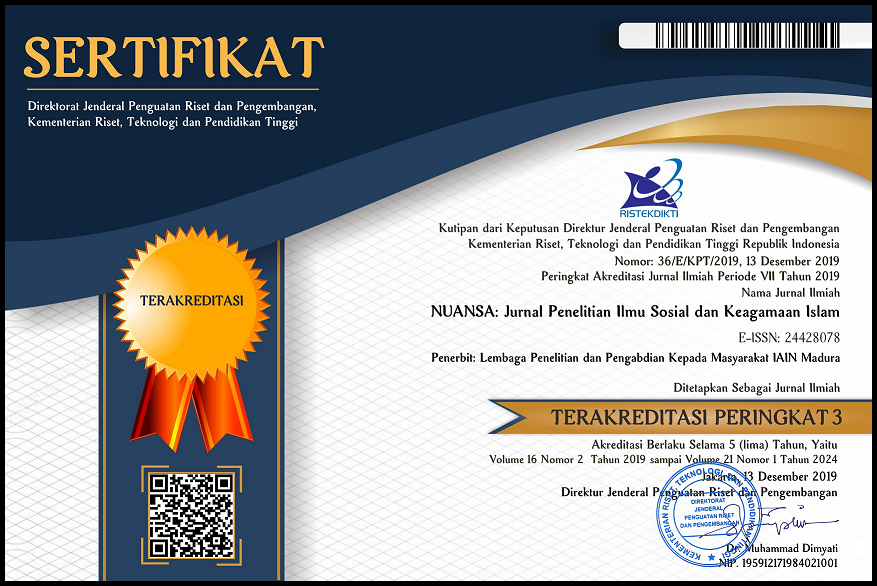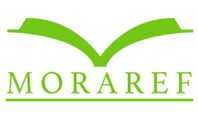Penguatan Character Building Peserta Didik Melalui Kurikulum Berbasis Lingkungan
 Abstract views: 380
,
Abstract views: 380
,
 PDF downloads: 292
PDF downloads: 292
Abstract
Character building memang sedang marak digaungkan oleh civitas akademika untuk terus dikembangkan dalam ranah pendidikan di sekolah. Dengan character building ini diharapkan dapat menurunkan tingkat degradasi moral para pemuda di Indonesia. Penelitian ini dimaksudkan untuk mendiskripsikan proses penguatan character building sekolah adiwiyata nasional di Kabupaten Pamekasan. Bagaimana kurikulum berbasis lingkungan hidup diterapkan, bagaimana desain perencanaan pembelajaran dilakukan, serta karakter apa saja yang dikuatkan dan mendiskripsikan bagaimana proses penguatan nilai- nilai karakter tersebut. Penelitian ini merupakan sebuah studi kasus yang dilakukan di sekolah adiwiyata nasional yaitu MTsN 2 Pamekasan. Data yang diperoleh oleh peneliti melalui observasi, wawancara serta dokumentasi kegiatan adiwiyata di sekolah tersebut. Sedangkan hasil penelitian menunjukkan bahwa MTsN 2 Pamekasan menerapkan semua komponen dalam program adiwiyata dan melakukan internalisasi kepada semua warga sekolah untuk melaksanakannya. Konten Adiwiyata juga ditambahkan dalam perencanaan pembelajaran sampai penilaian yang dilakukan oleh guru dala setiap POKJA (Kelompok Kerja) di luar kelas, dalam kegiatan ekstrakurikuler, dan aktivitas lingkungan berbasis partisipatif untuk mengukur sejauh mana keberhasilan program Adiwiyata itu sendiri.
(Character building has been loudly spoken by many environmental practitioners including teachers to be developed in education side. It is expected to decrease the moral degradation of Indonesian’s youths. This study is trying to describe the process of strengthening the students’ character building in a National Adiwiyata School Pamekasan Regency. How the school applies the environmental based curriculum, how the teachers design the teaching preparation containing adiwiyata content, what are the characters being built. How the teachers strengthen the students’ characters are the focus of this study. This is a study case which is done in National Adiwiyata School MTsN 2 Pamekasan. The result shows that beside the implementation of all components of Adiwiyata Program, the school also did internalization to make sure that all elements of the school inserted Adiwiyata content in all aspects of education. The contents of Adiwiyata are also added into the design of teaching preparation and the teachers did evaluation on the students’ role in the POKJA (group work) outside the class, in the extracurricular activity, and in the participative based environmental activity to know the reinforcement works well.)
Downloads
References
“Al-Qur’an Pdf - Panyliksikan Google.” Accessed October 25, 2019. https://www.google.com/search?q=aAl-Qur%27an+pdf&rlz=1C1CHBF_enID862ID862&oq=aAl-Qur%27an+pdf&aqs=chrome..69i57.5774j0j7&sourceid=chrome&ie=UTF-8.
Fathurrohman, Pupuh, AA suryana, and Fenny Fatriany. Pengembangan Pendidikan Karakter. Cetakan kedua. Bandung: PT. Refika Aditama, 2017.
Kementerian LIngkungan Hidup dan Kehutanan. “Pedoman Teknis Penilaian Adiwiyata,” 2018.
Moleong, Loxy J. Metode Penelitian Kualitatif. Edisi revisi. Bandung: PT. Remaja Rosdakarya, 2012.
Mu’in, Fatchul. Pendidikan Karakter Konstruksi Teoritis & Praktik. Yogyakarta: Ar-Ruzz Media, 2011.
Mulyasa, E. Menjadi Guru Profesional. 15th ed. Bandung: PT. Remaja Dosdakarya, 2017.
Muslich, Masrur. Pendidikan Karakter; Menjawab tantangan Krisis Multidimensional. Jakarta: PT. Bumi Aksara, 2011.
Rahardjo, Mudjia. “Studi Kasus Dalam Penelitian Kualitatif: Konsep Dan Prosedurnya,” 2017.
saondi, Andi, and Aris Suherman. Etika Profesi Keguruan. Ketiga. Bandung: Refika Aditama, 2015.
The journal operates an Open Access policy under a Creative Commons Attribution-NonCommercial 4.0 International License (CC-BY-NC) 
Authors who publish with this journal agree to the following terms:
- Authors retain copyright and grant the journal right of first publication with the work simultaneously licensed under a Creative Commons Attribution License that allows others to share the work with an acknowledgement of the work's authorship and initial publication in this journal.
- Authors are able to enter into separate, additional contractual arrangements for the non-exclusive distribution of the journal's published version of the work (e.g., post it to an institutional repository or publish it in a book), with an acknowledgement of its initial publication in this journal.
- Authors are permitted and encouraged to post their work online (e.g., in institutional repositories or on their website) prior to and during the submission process, as it can lead to productive exchanges, as well as earlier and greater citation of published work.






















